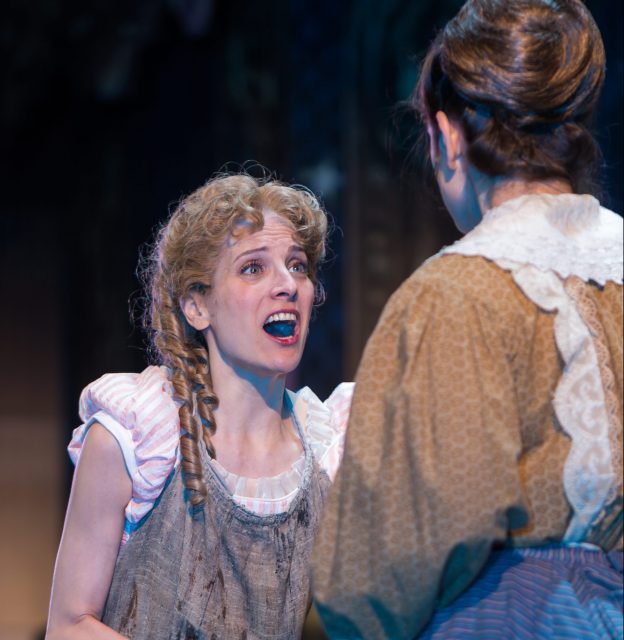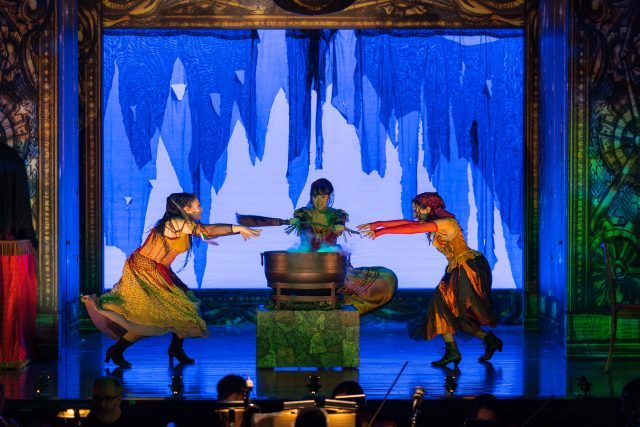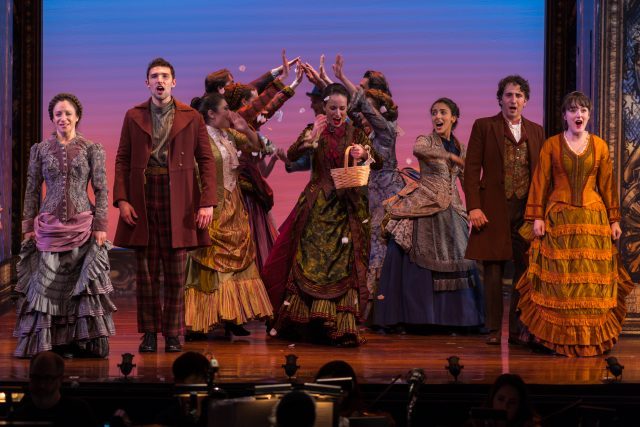
Jazmin Gorsline excels as bride-to-be Mirele in The Sorceress (photo © Victor Nechay – Properpix.com)
Museum of Jewish Heritage — A Living Memorial to the Holocaust
Edmond J. Safra Plaza, 36 Battery Pl.
Through December 29, $59-$125
866-811-4111
nytf.org
mjhnyc.org
Two years ago, the National Yiddish Theatre Folksbiene presented a work-in-progress version at the Museum of Jewish Heritage of The Sorceress (“Di Kishefmakherin”), the first Yiddish theater production to be performed in America. The company, which has had tremendous success with its spectacular adaptation of Fiddler on the Roof, is now back at its MJH home with a full staging of The Sorceress, a delightful if slight operetta that continues through December 29, including two special performances with a buffet on Christmas Day.

Dani Apple, Lexi Rabadi, Lorin Zackular work up some dastardly magic in National Yiddish Theatre Folksbiene production (photo © Victor Nechay – Properpix.com)
Written by Avrom Goldfaden, the Father of Yiddish Theater, it’s a Cinderella-like tale set in the town of Botoshani, Romania, where the young, lovely Mirele (Jazmin Gorsline) is preparing to wed the handsome and stalwart Markus (Josh Kohane). At her birthday party, she is sad, unable to celebrate because she misses her mother, who died too young. “Is it fair, my dear daughter, that you disturb the celebration with such sad thoughts?” her father, the wealthy Avromtshe (Bruce Rebold), sings. “Isn’t your stepmother faithful just like your very own mother?” he adds, but therein lies the problem. Avromtshe’s new wife, Basye (Rachel Botchan), is, yes, an evil stepmother who plots with the local sorceress, Bobe Yakhne (Mikhl Yashinsky), to make sure she gets exactly what she wants. She has her husband arrested and forces a separation between Markus and Mirele in a greedy plan that confounds the close-knit community, which is struggling to survive in hard times.
Unlike NYTF’s wonderful 2015 production of The Golden Bride, The Sorceress shows its age; written in 1877, it was brought to America in 1883 by fourteen-year-old actor and soon-to-be Yiddish legend Boris Thomashefsky. Some of the jokes are once-fresh (maybe) but now stale vaudeville routines, including one involving needles, salesman Hotsmakh (Steve Sterner), and Koyne (Lexi Rabadi), but other moments are heartbreaking, such as the handler’s (Rebecca Brudner) desperate call as she sells her wares. “Nobody in the world, / Can live out their years. / Without earning a little money. / A job is a burden,” she sings. Gorsline and Kohane are in fine voice, as is the always dependable Botchan. Yashinsky overplays the title character, chewing up far too much of Dara Wishingrad’s set, which resembles those used in a traveling show. Dani Apple, Lorin Zackular, and Rabadi are playful as a trio of witches; the large cast also includes Dylan Seders Hoffman as Basye’s daughter, Lize, Jonathan Brody as the conniving Uncle Elyokem, Mark Alpert as Katsef the butcher, and Samuel Druhora as the Turkish organ grinder. Izzy Fields’s appealing, elaborate costumes capture the era and its strife, while Merete Muenter’s choreography makes excellent use of the small space, especially in the market scene.

The Sorceress features a large cast at the Museum of Jewish Heritage (photo © Victor Nechay – Properpix.com)
But the real star of the show, which is helmed by NYTF associate artistic director Motl Didner, is the music, marvelously performed by Lauren Brody on accordion, Elise Frawley on viola, Evan Honse and Rebecca Steinberg on trumpet, Sam Katz and Inna Langerman on violin, Tony Park on clarinet, Reenat Pinchas on cello, George Rush on bass, Matt Temkin on drums and percussion, and associate musical conductor D. Zisl Slepovitch and conductor Zalmen Mlotek on piano. It’s light and frothy one moment, then dastardly and devious the next, as the story takes on such relevant topics as wealth inequality, human trafficking, and the spreading of wicked lies through the social construct. The Sorceress is the first fully restored work in NYTF’s Global Restoration Initiative, which resurrects lost Yiddish plays through extensive research. May there be many more.